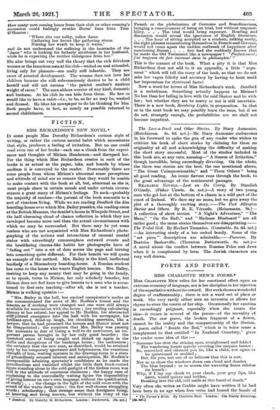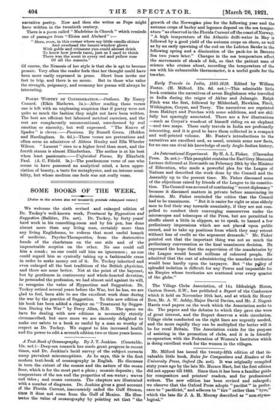POETS AND POETRY.
MISS CHARLOTTE MEW'S POEMS.*
Miss CHAELoTTE MEW relies for her emotional effect upon an extreme economy of language, nor is her discipline in her rejection of the superlative without its reward. Her work showsa wonderful degree of craftsmanship ; there is not a word out of place or weak. She very rarely either uses an' inversion or allows her rhyme to steer the course of her ship. Occasionally her emotion is exceedingly poignant, especially when she treats the idea—it recurs in several of the poems—of the unreality of death. The raw grave, the broken fragment of a flower, cannot be the reality and the, companionship of the illusion. A poem called " Beside the Bed," which is in some sense a complement to that entitled " In Nunhead Cemetery," gives the reader some idea of this :- "Someone has shut the shining eyes, straightened and folded The -wandering hands quietly covering the -unquiet breast : So, smoothed and- silenced you lie, like a child, not again to be questioned or scolded ; But, for yon, not one of us believelf that this is teat. Not so to close`the windows down can cloud and deaden
The blue! beyond : or to screen- the wavering flame subdue its breath •:
Why, if I lay my cheek to your cheek, your grey lips, like dawn, would quiver and redden, Breaking kite the old, odd sMile at this fraud of death."
Very often she- writea Crabbe might have written if he had' been born in all age' when -free verse had loosed- thertiondS of • The Paha. Bride. Ify Charlotte Nevi. London : The Poetry Bookshop, Ha. asta
narrative poetry. Now and then she writes as Pope might have written in the twentieth century.
There is a poem called " Madeleine in Church " which reminds one of passages from "Eloisa and Abelard" " Here, even, in this corner where my little candle shines
And overhead the lancet-window glows With golds and crimsons you.could almost drink To know how jewels taste, just as I used to think There was the scent in every red and yellow rose
Of all the sunsets."
Of course, the Nemesis of her style is that she is apt to become
prosaic. Very often the reader feels that her thought could have been more easily expressed in prose. Short lines invite our feet to trip, and there is no music. But to those who value the strength, poignancy, and economy her poems will always be interesting.



































 Previous page
Previous page